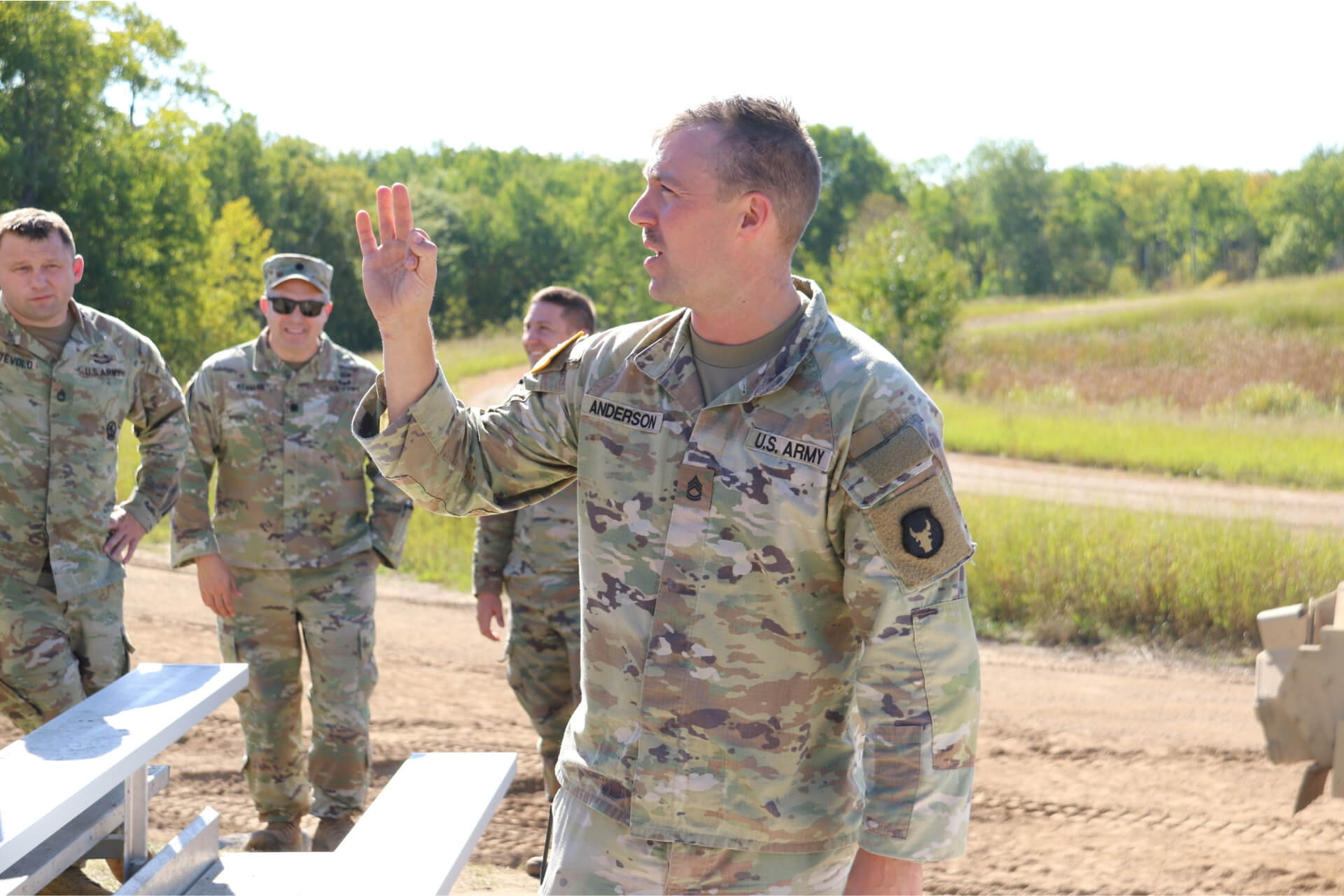Blog Navigation: Business Insights and Spotlights | Chamber Blog
09.30.25
Lessons in Leadership from Camp Ripley
By Cale Dunwoody, Vice President of Public Policy, FMWF Chamber

Minnesota National Guard member speaking on leadership to Chamber members at Camp Ripley near Little Falls, Minn.
One challenge many organizations face is keeping a team motivated and ready for change. Shifting markets, limited resources and constant pressure to adapt require careful planning and strong leadership. But how do you put that into practice?
A recent Chamber-led visit to Camp Ripley in Little Falls, Minn., offered a firsthand look at how the Minnesota National Guard navigates these challenges. Attendees observed how teams handle uncertainty, develop talent and maintain resilience under pressure. The day revealed practical strategies that can be applied in any organization.
Keep reading to discover key takeaways that can help your team work more effectively, respond to change and strengthen skills.
Retention Starts Before Day One
The Guard has more than 10,500 members across Minnesota, and recruiting new talent is a continual effort. Retaining that talent is even harder, with rates typically landing between 65–70%, below the 90% goal. Soldiers who commit to a second contract, however, are far more likely to make the Guard a long-term career.
Retention isn’t about incentives alone. It’s about creating systems that help teams succeed. Soldiers are guided in balancing military and civilian careers, and leadership invests in their professional growth at every stage.
Actionable takeaway: Build structured support into your team’s career paths. This can include mentorship programs, clear advancement opportunities and check-ins to address challenges before they escalate. Investing in retention from day one keeps your people engaged and prepared to grow.
Training as a Foundation for Readiness
At Camp Ripley, a tank training facility prepares soldiers for high-stakes, real-world scenarios. This year, new technology was introduced in their tanks, making training even more rigorous and essential. While learning the mechanics, soldiers learn how to adapt, problem-solve and lead under pressure. This relentless focus on preparation ensures soldiers are equipped to carry out complex missions while using the military’s most modernized tools.
Actionable takeaway: Prioritize ongoing development and structured training programs. Whether through cross-training, upskilling or early career pipelines, equipping your team with the skills they need ensures adaptability and long-term success.
Flexibility Strengthens Teams
Minnesota National Guard members serve both the President of the United States and the Governor of Minnesota, requiring rapid response to national or state emergencies. Teams are cross-trained, plans are scenario-based and roles are adaptable so operations can continue without disruption.
Actionable takeaway: Build flexibility into your team’s structure. Encourage skill development across roles, plan for shifting priorities and empower teams to respond effectively when circumstances change. Flexibility allows organizations to maintain performance under pressure.
Advocacy Protects Critical Resources
Funding for education, training and operations can change quickly due to federal and state budgets. Education reimbursement programs and training, which are essential for recruiting, developing and retaining soldiers, are often constrained by federal and state budgets. Leaders at Camp Ripley emphasized the importance of communicating needs and advocating for resources to maintain readiness.
Actionable takeaway: Identify critical resources within your organization—budgets, tools or programs—and proactively support them. Clear communication and advocacy help ensure stability, enabling teams to focus on their work rather than scrambling when resources shift.
Strong Teams Rely on Community Support
Every soldier depends on the network around them: employers who provide flexible schedules, families who offer stability and communities that invest in readiness programs. The visit highlighted just how much these support systems matter. Soldiers often face demanding schedules, like working two weekends a month in their civilian jobs on top of monthly Guard duty, which leaves little personal time. They’re also expected to manage responsibilities after hours, such as checking military communications, adding to the balancing act between service, work and home life.
Actionable takeaway: Recognize the value of support networks for your teams. Collaboration, flexibility and investment in professional and personal well-being strengthen loyalty, resilience and overall team performance.
Final Thought
Camp Ripley and the Minnesota National Guard demonstrate how preparation, adaptability and strong support systems sustain teams through uncertainty. Applying these same principles of structured retention, ongoing training, flexibility, advocacy and strong networks can help any organization remain resilient, capable and prepared for the challenges ahead.
To see these principles in action and explore ways to support local service members, consider getting involved with the Chamber’s Military Affairs Committee. It’s an opportunity to strengthen both your team and the broader community.
Next Meeting: Thursday, Oct. 9
The FMWF Chamber’s Military Affairs Committee invites you to join us for our October meeting, featuring a panel discussion on Military Friendly Workplaces. This timely conversation will highlight strategies, resources and best practices for businesses to better support service members, veterans and military families in the workplace.
This discussion will give attendees key insights and practical tools to build stronger, more inclusive workplaces while deepening their support for military service members and families.
SHARE
More Stories
Upcoming Events
Subscribe to email newsletters
